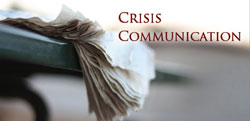Reputation, reputation, reputation: The 3 key ingredients for crisis management in the social media age
14 December 2011 By Northern Lights

 In an age of 24 hour news and social media, everything you do is under scrutiny and corporate reputation is more precarious than ever.
In an age of 24 hour news and social media, everything you do is under scrutiny and corporate reputation is more precarious than ever.
A top corporate headhunter recently told PR Week’s editor Danny Rogers that corporate affairs directors have gained more influence than marketing directors over the past few years. Rogers puts this down to the fact that many CEOs are now putting reputation among the top three items on the board agenda.
As shown in my previous blog, the FOI Act has forced public sector organisations to be transparent – and social media is forcing the private sector to do the same. Evidence of misdemeanours can be captured on mobile phones and shared instantly and disgruntled employee/customer opinions have moved from the pub to blogs, discussion forums and Facebook campaigns. When a crisis hits, there’s no time to read the manual before acknowledging, apologising and putting things right. Other people will create the content and it could be viral within minutes. It is also indelible and will have a much longer impact.
Here are the 3 key ingredients for protecting your reputation by effectively planning for and managing crises in the social media age
1. Improve internal communications
There is no longer a clear distinction between external and internal affairs – how you are on the inside is what will be reflected externally. Good crisis planning is about being a good business, not just saying you are.
Excellent internal communications and employee engagement is core to being transparent and resilient. Every employee is now your spokesperson for your organisation. They need to be properly trained, consulted, engaged and be given guidelines on using social media in their professional guise (see our guide to creating an employee social media policy).
It is more critical now than ever before, that your organisation has an outstanding communicator on the board – or who operates at board level and is respected by them – and the rest of the organisation.
2. Monitor your online reputation
Whether you are using social media to interact with your customers or not, it is likely that someone will be talking about you online. If you are not there, you are likely to be missing out on opportunities to improve and grow your business.
Some online conversations can help you identify and capitalise on your fans. We held a social media workshop earlier this year in which someone from a cosmetics brand discovered a Facebook fan page with tens of thousands of followers and a bank of testimonials that they knew nothing about.
Other online conversations pose potential crises – but if you are aware of them, the crisis can be quashed or at least minimised. In many cases, it is not appropriate to intervene in discussions because you will be limiting people’s freedom of speech, which is what social media is all about. However, if questions are raised, you can provide useful answers – as long as you are open about who you are.
If a campaign group is planning a protest outside your offices via a Facebook group, use the intelligence about their plans to start a dialogue with them. If a customer posts a negative comment or complaint on Twitter, don’t get defensive or ignore it. Use it as an opportunity to show the rest of world that you have acknowledged and dealt with the problem. However, don’t rely on this as your main form of customer service – it’s no good if people can’t reach you on the phone but see that you’re responding immediately to tweets.
3. Create your own online content
In the face of a crisis, a BBC interview with your chief executive is still the best way to get your acknowledgement, apology and response out to the masses. But, depending on the scale and type of the crisis, this is not always necessary. It may be that those affected are limited to a particularly online community, in which case their opinions will take precedence over the facts.
By creating your own multimedia content online that is useful and gives readers the opportunity to comment you can lead the debate. This might be a video explaining what to do to address the problem that can be embedded and shared on blogs and forums.
There is no such thing as post-crisis planning – only fire fighting. So don’t wait until something goes wrong to do something about it. Make sure you have a crisis communications plan in place, that it is up to date – and includes the impact of social media in its risks and scenarios.
